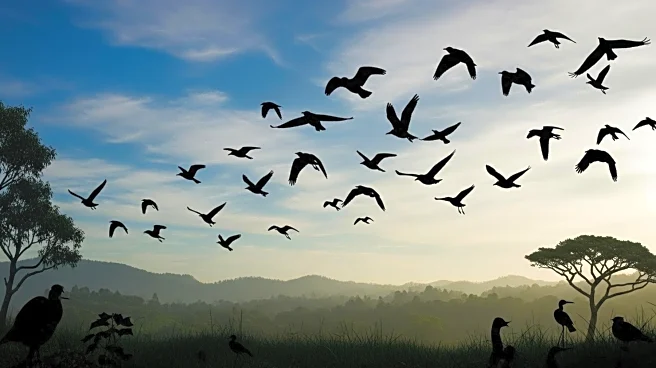What is the story about?
What's Happening?
Scientists are raising alarms about the impact of climate change on bird migration patterns, which could have severe consequences for both avian species and human populations. According to Andrew Farnsworth, a migration ecologist at Cornell University, the disruption is not localized but affects avian ecosystems globally. Birds are being forced to relocate as their traditional habitats become unsuitable due to changing climate conditions. This shift is particularly evident in the Arctic and Boreal forests, where warming temperatures and wildfires are prevalent. The Red Knot, a shorebird that migrates from the Arctic to South America, has seen a population decline of approximately 75% due to disrupted breeding grounds and rising sea levels. The National Audubon Society warns that 389 North American bird species could face extinction within the next 50 years.
Why It's Important?
The disruption of bird migration patterns has far-reaching implications for global ecosystems and human economies. Birds play a crucial role in pollinating plants, with about 5% of plant species relying on them. A decline in bird populations could lead to reduced food production and impact cash crops like coffee and chocolate. Additionally, birds help control insect populations, and their decline could lead to increased pest issues. Economically, the loss of bird species could affect industries reliant on bird-pollinated crops and pharmaceuticals. The situation underscores the interconnectedness of climate change impacts, affecting biodiversity, food security, and economic stability.
What's Next?
Efforts to mitigate the impact on bird populations include reducing light pollution, which can confuse migrating birds, and providing food and water sources during migration periods. Conservationists and scientists are likely to push for more robust climate action to protect avian habitats and address the broader impacts of climate change. Public awareness campaigns may also be initiated to encourage individual actions that support bird conservation.
Beyond the Headlines
The decline in bird populations highlights ethical considerations regarding humanity's responsibility to protect biodiversity. It also raises questions about the long-term sustainability of current agricultural practices and the need for adaptive strategies in response to climate change. The situation may prompt increased research into alternative pollination methods and the development of climate-resilient crops.















